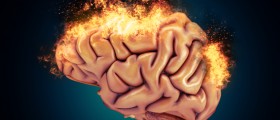
Dementia is a progressive disorder of brain function. Progressive disease means that condition of affected people is getting worse as time passes. There is no cure for dementia. There are only some medications that slow progression of disease and reduce its symptoms. Many of these medications have side effects and they are effective for short time. Also, often monitoring of patient’s blood levels is needed because of toxicity prevention.
One of medications used for dementia treatment are Acetylcholinesterase inhibitors (AChE). USA Food and Drug Administration approved following AChE inhibitors: rivastigmine, donepezil, galantamine and tarcine. They are used for treatment of dementia diseases like Alzheimer’s disease and Parkinson disease. But, effectiveness of these inhibitors is not permanent and inhibitor does not improve condition dramatically. Brain cells need acetylcholine for communication between them. Dementia destroys this brain chemical. AChE inhibitors slow acetylcholine to break down. When you start using this drug, you must not stop taking it ever. This can cause severe behavioural and cognitive problems.
People with liver problem and allergy to AChE inhibitor must not use this drug. AChE inhibitors must not be used with drugs such as erythromicin, ketoconazole, paroxetine, cimetidine because these drugs increases toxicity of inhibitors. Antihistamines and bladder control drugs make AChE inhibitors less effective. This drug is used for mild or moderate Alzheimer’s disease. Side effects of AChE inhibitors are headaches, fainting, nausea, dizziness, vomiting, red skin, diarrhea, muscle cramps and loss of appetite.
Other drug for dementia is used for moderate or severe Alzheimer’s disease. Its name is N-methyl-D-aspartate blockers (NMDA blockers). NMDA blockers can improve basic daily activities like grooming, dressing, eating. This blockers can be combined with AChE inhibitors for dementia treatment. NMDA receptors are overexcited by glutamate. Glutamate is brain chemical. NMDA blockers stop receptors for being overexcited. These blockers are also used for diseases such as vascular dementia, AIDS related with dementia and Huntington disease. People allergic to NMDA blockers must not use these drugs. Side effects of NMDA blockers are headache, constipation and dizziness.
Investigational drug for dementia treatment is amyloid deposit inhibitors. People with Alzheimer’s disease have amyloid deposits in brain. These inhibitors decrease amyloid deposits.
Some medications for dementia treatment are used to improve changes in behaviour of affected person such as depression, psychosis, anxiety. These drugs are antidepressants, anti-anxiety and anti-psychotic drugs. Many people with dementia have depression, anxiety and psychosis so doctors have to prescribe them these drugs.
There are also some drugs that help to slow or prevent progression of dementia disease. Their effectiveness is not certain. These drugs are: anti-inflammatory agents, estrogen, selegiline, statins and antioxidants.

















Your thoughts on this
Loading...